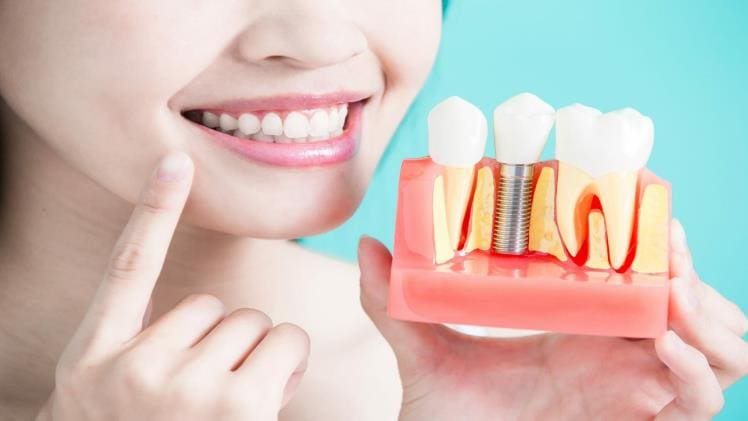Choosing between dentures Las Vegas and dental implants is significant, especially when natural teeth can no longer grow back. Understanding the differences, advantages, and disadvantages of dentures and implants is crucial in making an informed choice that aligns with your lifestyle, preferences, and oral health needs.
Dentures
Dentures are dental appliances you can remove whenever you want. It is designed to replace your missing teeth and surrounding tissues. They come in two main types: complete dentures, which replace all teeth in an arch, and partial dentures, which replace some missing teeth while relying on remaining natural teeth for support.
One of the primary advantages of dentures is their affordability compared to dental implants. Dentures are a more cost-effective option, making them accessible to a broader range of individuals. They also provide a non-invasive solution, as the placement of dentures does not involve surgery.
However, there are drawbacks to dentures. They may require frequent adjustments as the jawbone changes shape over time, affecting the fit. Dentures can be less stable than implants, leading to potential discomfort and difficulty speaking or eating. Additionally, some individuals find dentures less aesthetically pleasing, as they may not replicate the natural appearance of teeth as effectively as implants.
Dental Implants
Dental implants, on the other hand, are a permanent and surgically implanted solution for replacing missing teeth. They consist of a titanium post inserted into the jawbone, acting as an artificial tooth root. A prosthetic tooth, often a crown, is attached to the implant, creating a stable and natural-looking replacement.
One of the significant advantages of dental implants is their durability and long-term success. Implants integrate with the jawbone, promoting bone health and preventing bone loss, a common issue with dentures. They offer superior stability, allowing individuals to eat and speak with confidence. Implants also closely resemble natural teeth, both in appearance and function.
However, dental implants come with a higher upfront cost than dentures in Las Vegas. The implant placement procedure involves surgery, which may have associated risks and a longer recovery period. Not everyone may be a suitable candidate for dental implants, as a healthy jawbone is required to support the implant.
Choosing Between Dentures and Implants
The decision between dentures and dental implants depends on various factors, including budget, oral health, lifestyle, and personal preferences. While dentures are more affordable and non-invasive, dental implants offer a more permanent and natural-looking solution with long-term benefits.
Consult a dentist or oral health professional to assess your situation. They can provide personalized recommendations based on your oral health, budget, and lifestyle, helping you make an informed decision that aligns with your needs and preferences.
Additionally, staying knowledgeable about advancements in dental technology can aid in understanding emerging options that further enhance your choices in tooth replacement. Ultimately, the right choice for you will depend on a combination of factors, and seeking professional advice is key to achieving optimal oral health and overall well-being.
Prolonging the Lifespan of Your Dentures: 10 Expert Care Tips
- Handle with Care: Treat your dentures with the same delicacy as you would your natural teeth. Stand over a folded towel or a basin filled with water when handling them. This precautionary measure can prevent damage if you accidentally drop them.
- Clean Thoroughly: Regular cleaning is key to maintaining the longevity of your dentures. Use a soft-bristled brush or a denture-specific brush to clean all surfaces, including the gums and tongue, to remove any debris or bacteria. Avoid using abrasive materials that could scratch the denture surface.
- Use Mild Cleaning Products: Choose cleaning products specifically designed for dentures. Mild dish soap or specialized denture cleansers are ideal. Harsh chemicals and toothpaste can be abrasive, leading to damage and deterioration over time.
- Soak Overnight: Allow your dentures to soak overnight in a cleaning solution or plain water. This helps to keep them moist, preventing any warping or distortion that might occur if they dry out. Follow the manufacturer’s recommendations for soaking time and cleaning solutions.
- Regular Dental Check-ups: Make sure to list regular dental check-ups with your dentist on your to-do list to ensure your dentures fit properly. Ill-fitting dentures can lead to discomfort and sores and may contribute to faster wear and tear. Your dentist can make necessary adjustments and provide professional cleaning to maintain optimal performance.
- Avoid Hot Water: While cleaning your dentures, avoid using hot water, as it can cause them to warp. Instead, get lukewarm water for cleaning and rinsing.
- Handle Adhesives with Care: If you use denture adhesives, apply them sparingly. Excessive use can lead to a buildup that is difficult to clean. Follow your dentist’s recommendations on the appropriate amount to use.
- Store Properly: Store your dentures in a denture-soaking solution or plain water when not used. Avoid leaving them in a dry environment, which can lead to distortion.
- Be Mindful of Food Choices: Cut food into smaller, manageable pieces to reduce stress on your dentures. Avoid biting into hard or sticky foods that could cause damage.
- Handle Repairs Professionally: If your dentures become damaged or ill-fitting, resist the urge to repair them yourself. DIY fixes may lead to irreparable damage. Consult your dentist for professional repairs or adjustments.
By following these expert tips, you can significantly extend the lifespan of your dentures, ensuring they continue to provide comfort, functionality, and a confident smile for years to come.

